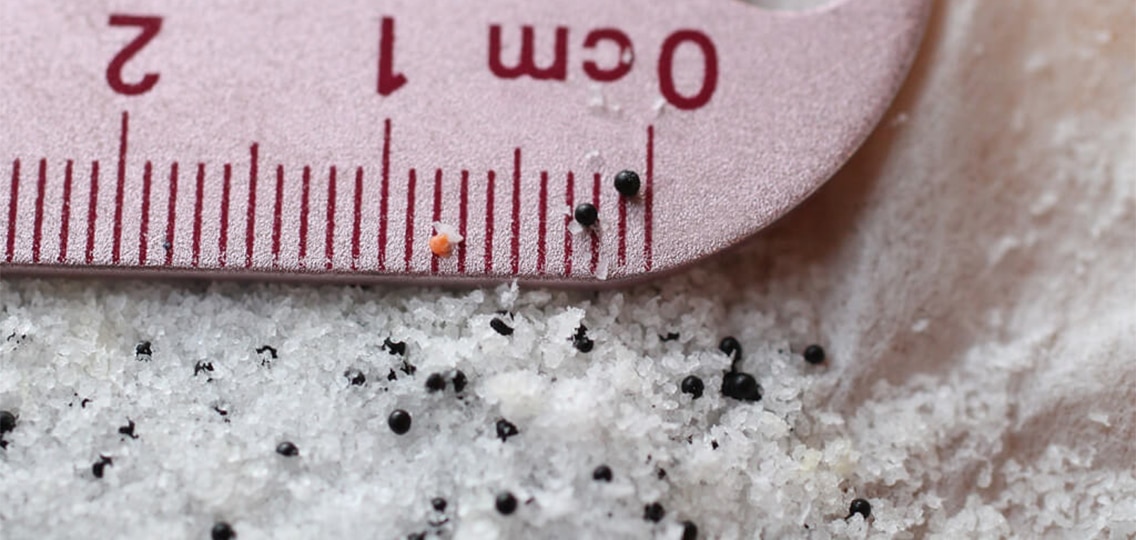Microbeads are tiny plastic beads commonly used for their exfoliating properties in personal care products such as facial cleansers, body wash and toothpaste. Generally 0.5 mm or smaller in diameter, these particles get rinsed down drains during use, and are dispersed into the environment through wastewater treatment plants which are not designed to remove or treat microbeads. Treated wastewater is then typically discharged into freshwater rivers or lakes.
Microbeads are an emerging issue of global concern. One study, for example, found a single tube of facial scrub to contain more than 330,000 microbeads. These tiny bits of plastic are now distributed widely in both marine and freshwater environments — in the water, on the seabed, and on beaches. They are ingested by many organisms throughout the food web, including plankton, invertebrates, small fish, birds and mammals. Along the way they act as sponges for dangerous chemicals and contaminants such as PCBs and flame retardants — which accumulate in species low on the food chain and are passed on to larger predators, eventually contaminating the fish and wildlife species that humans eat.
In the face of increasing public concern over the use of microbeads, a number of large personal care product manufacturers have expressed their intention to phase them out and replace them with biodegradable alternatives. This is an important first step, as microbead use is completely unnecessary: Effective biodegradable alternatives, such as ground apricot kernels and jojoba beads, are readily available and already widely used in personal care products.
There’s also growing momentum in the United States to get microbeads out of personal care products. Last year, Illinois enacted legislative provisions that will prohibit the manufacture and sale of personal care products containing microbeads. New Jersey just followed suit and enacted similar legislation. A ban is also looking promising in Indiana, and Ohio, New York, California, Minnesota, Wisconsin, Vermont, Maine, and Washington State are all currently considering similar legislative measures.
Meanwhile in Canada …
No similar efforts have yet occurred in Canada except for the recent introduction of a private member’s bill to ban the manufacture and addition of microbeads to consumer products in Ontario — even though plastic microbeads are a particular environmental threat to Canada’s iconic Great Lakes. In fact, microbeads make up 20 per cent of plastic pollution in the Great Lakes, which provide drinking water to 8.5 million Canadians.
Scientists have found millions of microbeads in just one square kilometre of parts of the Great Lakes. These bits of plastic have been found in Lakes Superior, Huron, and Erie, as well as in the St. Lawrence River, with the highest concentrations occurring near urban areas. Sample analyses show that the majority of microbeads come from facial cleaners.
And yet, a wide variety of products containing microbeads are still available on the Canadian market. While voluntary measures from manufacturers are a good first step, we cannot rely on that alone to prevent these substances from polluting water bodies. It’s time for Canada to take action and address the threats microbeads pose to the environment and, by extension, our health.
That’s why, on behalf of Environmental Defence, Lake Ontario Waterkeeper, and Ottawa River Waterkeeper, Ecojustice staff lawyer Tanya Nayler has submitted a request to Minister of the Environment Leona Aglukkaq asking that plastic microbeads used in personal care products be added to the Priority Substances list so that these can be assessed, designated and regulated as a toxic substance under the Canadian Environmental Protection Act, 1999. The Minister must respond to this request, with reasons, within 90 days.
The letter also asks Minister Aglukkaq to review Illinois’ decision to ban microbeads. Under CEPA, when the Minister receives notice that that another jurisdiction has or substantially restricted a substance for environmental or human health reasons, she is required to determine if that substance is toxic and should be regulated.
Our hope is that this request will put into motion the necessary steps to initiate a Canada-wide ban on microbeads, keeping these unnecessary pieces of plastic from piling up in our oceans, lakes and rivers and putting the environment and our health at risk.





